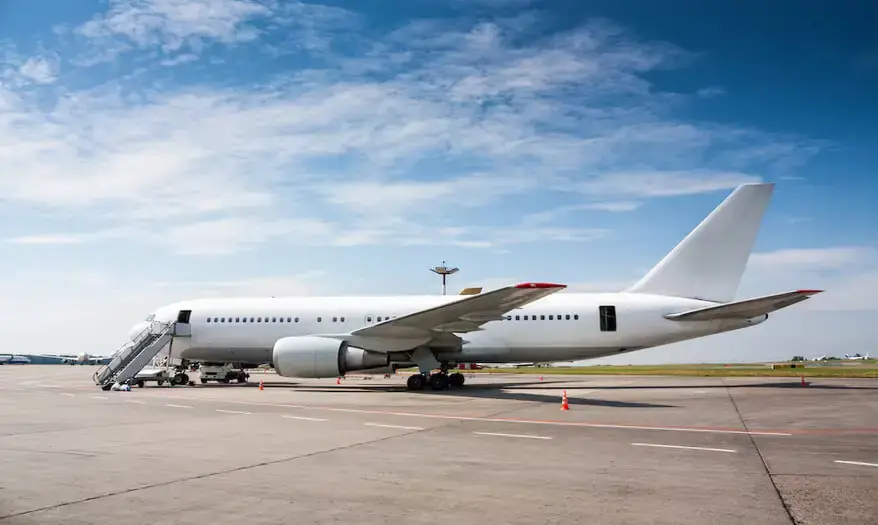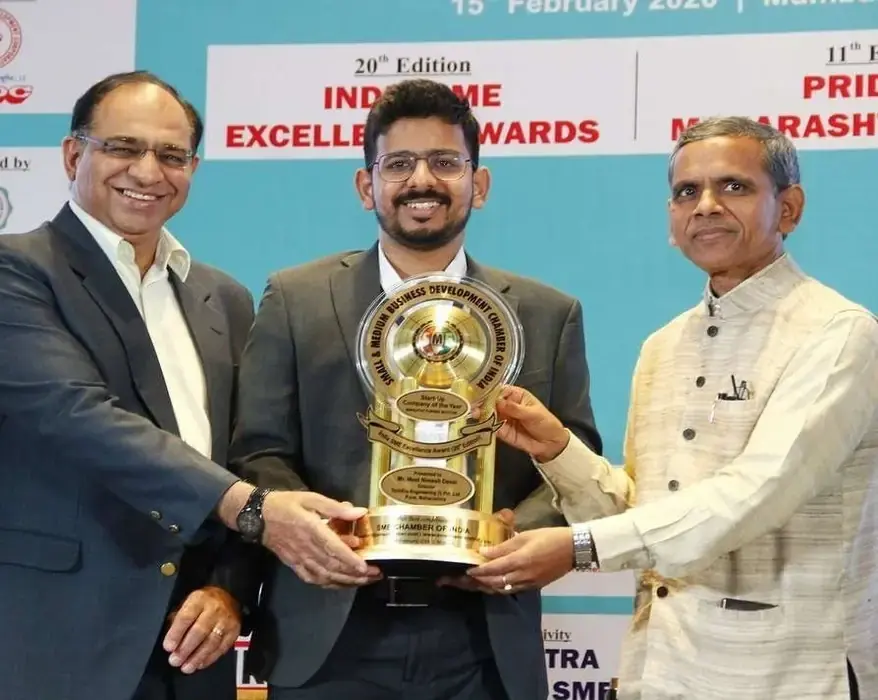TechEra Engineering: Flying Start for Make in India
Meet Desai an entrepreneur, a passionate, focused, and enthusiastic businessman with contemporary skills and knowledge to achieve excellence in aerospace engineering. He believes in growing with a team of strong and like-minded people. Co-founder of TechEra Engineering (I) Pvt Ltd. He is presently working on an Unmanned Aerial Vehicle (UAV) project code-named VISION. The team is currently working on the project and will complete it soon. Meet completed his degree and diploma in mechanical engineering and pursued his post-graduation in aerospace engineering from the University of Southampton, United Kingdom, in 2014. Below are excerpts from his interaction with the editorial board members.

Meet Desai: A Visionary Entrepreneur in Aerospace Engineering
What inspired you to transition from being a scientist/engineer to becoming an entrepreneur?
In 2014, I returned from the UK after completing a master’s degree in aerospace. Consequently, I naturally avoid the service-oriented culture of 9-5 work. At that time, I joined my family’s business, but eventually, I realized that the industry did not align with my interests and skills.
Challenges as an Entrepreneur
In 2018, I made an instinctive decision to form TechEra Engineering , which allowed me to venture into a new domain. This decision was based on acquiring business skills from my father’s business and reflected in my desire to change and explore a new area that appealed to me more.
Starting a new venture can be exciting and challenging. It offers an opportunity to apply your skills and interests in a field that you find more suitable. It’s essential to continue learning and adapting while building the business. In addition, leveraging the knowledge and experience from my family’s business proves to be a valuable asset in my entrepreneurial journey with TechEra Engineering.
The Turning Point: Embracing Entrepreneurship

Can you share a specific moment or experience that solidified your decision to pursue entrepreneurship?
A transformative encounter with a successful entrepreneur shaped my journey toward entrepreneurship and inspired me to break free from the constraints of traditional employment and pursue my ideas. When I left my father’s business, I started writing a resume to apply for a job.
I couldn’t write a resume for three months, and then it sparked me that a conventional job is not my passion.
It was a constant reminder of the importance of following one’s passion and the untapped potential within each of us to create positive change through entrepreneurial endeavors. Since that moment, I have dedicated myself to the pursuit of entrepreneurship. I have immersed myself in studying business strategies, exploring innovative ideas, and networking with like-minded individuals who share my vision. I have also taken practical steps towards achieving my entrepreneurial goals.
As a young entrepreneur, what challenges did you face in establishing your business
I started as a second-generation entrepreneur by starting my career by working with my father and managing his family businesses. However, this transition comes with its challenges, mainly due to the differing views and expectations of the people involved. A key challenge faced was managing various stakeholders’ diverse opinions and expectations. To overcome these challenges, I adopted a focused approach and prioritized equality, positivity, and humanitarianism. Additionally, I implemented job and people rotation strategies wisely to enhance the chances of long-term success further.
Balancing Technical Expertise with Business Strategy
How do you balance the technical aspects of your background with the business side of running a company?
Including technical know-how in business decision-making and work, delegation is essential for modern organizations to thrive in a highly competitive and technologically driven world. By harnessing the power of technical knowledge, leaders can make informed decisions, delegate work effectively, and match individuals’ skills to job requirements. This ensures optimal performance, enhances productivity, and promotes job satisfaction, thus contributing to the organization’s overall success.
What advice would you give to aspiring scientists and engineers who are interested in starting their own businesses?
Transforming the mindset from “Chalta Hai” to a disciplined, focused approach, sustained effort, and commitment at all levels of the organization is required. By embedding excellence, ethical practices, and continuous improvement into the core of your business, you can achieve a competitive edge and build a resilient, sustainable operation.
Key Skills for Success in TechEra Engineering
In your opinion, what skills or qualities are necessary for success as an entrepreneur in the scientific or engineering field?
Success as an entrepreneur in the scientific or engineering fields demands a unique blend of technical expertise, business acumen, and personal qualities that enable innovation, resilience, and strategic growth. Some of the essential skills required are technical expertise, innovative thinking, the ability to think outside the box, problem-solving, risk management, adaptability and resilience, leadership and team building, networking and communication, ethical integrity, ethical integrity, continuous learning, and customer focus with the value addition at no extra cost.
Tell us about a particularly innovative or ground-breaking project that you’ve worked on as an entrepreneur for TechEra Engineering (I) Pvt Ltd.
Implementing a project of almost four crores with a team 25 in a remote area was challenging. The team worked day and night for three days; under such conditions, we could hardly sleep due to the harsh environment and work pressure. Nevertheless, this experience tested my capability to build the team and ultimately reaffirmed my potential to achieve whatever I dream of.
Strategies for Attracting Investors
How do you approach finding and attracting investors for your ventures?
IDBI is a significant financier for our company. Due to our clean accounting records, it is easy for financing companies to sanction necessary project loans to TechERA Engineering.
What strategies do you employ to stay ahead of the competition in such rapidly evolving industries?
Technical know-how is utilized for making business decisions, delegating work, and ensuring the right people are assigned the right tasks. Strategies for ecosystem development, quality assurance, and policies are implemented to address workforce retention and boost employee morale. Emphasis is also placed on instilling values in the workplace, such as attention to detail and efficient packaging.
Advice for Aspiring Scientist-Entrepreneurs
What advice would you give to young students who aspire to pursue a career in the aerospace industry?
Pursuing a career in the aerospace industry can be incredibly rewarding, offering opportunities to work at the forefront of technological advancements in aviation, space exploration, and defense. Prioritize strong foundations in science, technology, engineering, and mathematics (STEM) subjects at high school and higher secondary school levels, as these are critical for a successful career in the aerospace field. Advanced knowledge in physics, calculus, and engineering principles is essential.
The aerospace industry is constantly evolving with new technologies and methodologies. Stay curious and committed to learning in formal education and through self-study and online courses, and stay abreast of industry trends and breakthroughs. Seek internships, co-op programs, or part-time jobs in aerospace companies to gain hands-on experience. Practical experience is invaluable and can significantly enhance your understanding of the industry and improve your employment prospects. Additionally, they can participate in or initiate projects related to aerospace. While technical skills are crucial, soft skills like teamwork, communication, and leadership are equally important in the aerospace industry. You’ll often work in multidisciplinary teams, and the ability to communicate effectively and lead projects is invaluable.
Innovations and Groundbreaking Projects
How do you balance the innovative and creative aspects of entrepreneurship with the technical demands of the aerospace field?
I motivate the team to explore creativity in processes. For instance, we have modified the pipe bending operation to reduce costs drastically. Moreover, we have created a conducive environment that fosters creativity, which helps to alleviate the boredom of monotonous work.
What are some key lessons you have learned about leadership and team management as an entrepreneur in the aerospace industry?
One of the most important lessons I have learned is the significance of developing an organogram and prioritizing the well-being of workers. In addition, we have realized that competition is essential for creating a better ecosystem. To address this, I implemented an alternate Saturday holiday to reduce attrition and retain good employees. Furthermore, we have also focused on providing value addition through our technical strategies during project handover.
Staying Ahead in a Competitive Industry
In what ways do you think your experiences as an entrepreneur differ from those who have followed a more traditional career path in engineering or research within the aerospace domain?
One significant difference is that an entrepreneur must develop a holistic understanding of the industry, which includes its market dynamics, competitive landscape, and customer needs.This would require you to step out of the technical realm and immerse yourself in business strategy, marketing, and finance. Additionally, as an entrepreneur, you must possess strong leadership and management skills to navigate uncertainties and make critical decisions for your venture.
Another distinction lies in the risk-taking aspect of entrepreneurship. While traditional career paths within aerospace may offer stability and predictability, you would be exposed to higher levels of risk and uncertainty as an entrepreneur. Specifically, starting a new venture often requires taking calculated risks, seeking investment opportunities, and adapting to changing market conditions. This dynamic environment requires you to be resilient, innovative, and constantly willing to learn and adapt to new challenges.
Pune’s Potential as an Aerospace Hub
Since Pune is auto hub how do you see Pune becoming aerospace hub?
The basic manufacturing process is almost identical in the auto and aerospace sectors. Skill is not an issue. The ecosystem of auto hubs encompasses a network of suppliers, manufacturers, research institutions, and skilled labour developed to support the design and production of automobiles. This ecosystem has led to technological advancements, process efficiencies, and a skilled workforce, all vital for the aerospace industry.
The precision TechEra engineering and quality control processes developed for automobile manufacturing can be adapted to aerospace manufacturing, ensuring the production of high- quality and reliable aerospace components. The skilled labor force trained in the auto hubs can therefore be retrained and utilized in the aerospace industry, effectively addressing the shortage of skilled workers that the aerospace industry often faces.
Moreover, the supply chain and logistics expertise developed in the auto hubs can be highly invaluable for the aerospace industry, as it significantly aids in the efficient sourcing and transportation of aerospace components and materials. The main challenge is the documentation and mindset of the ecosystem and the “chalata hai” attitude of middle management. It takes two months to make documents, which needs to be done as per aeronautical standards.
Role of Government and Stakeholders in Aerospace Growth
How do you see government and other stakeholders contributing to the future growth and development of the aerospace industry?
The government, along with IDBI as an investor, provides extensive support. Furthermore, the offset policy and initiatives like Make in India further reinforce the government’s positive stance. In addition, they have also shown strong support during the COVID-19 period. The government is proactively reviewing policies and has been instrumental in the success of companies in the aerospace domain. The planned construction of 100 new airports will accelerate the growth of the aerospace industry and its ecosystem.
ENTECH Magazine wishes a grand success for all future endeavors of Meet Desai
and TechEra Engineering (I) Pvt Ltd.
Additionally, to stay updated with the latest developments in STEM research, visit ENTECH Online. Basically, this is our digital magazine for science, technology, engineering, and mathematics. Furthermore, at ENTECH Online, you’ll find a wealth of information.






